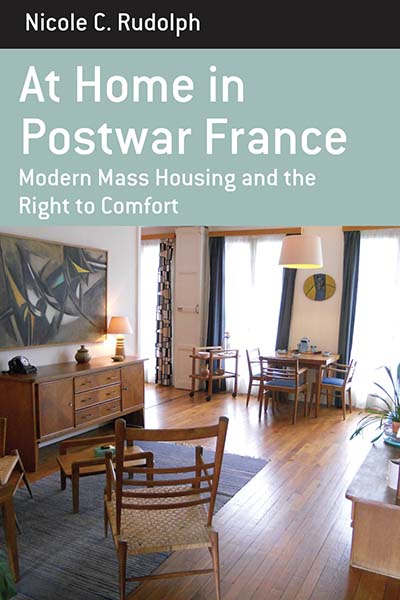
Series
Volume 14
Berghahn Monographs in French Studies
See Related
History JournalsEmail Newsletters
Sign up for our email newsletters to get customized updates on new Berghahn publications.
At Home in Postwar France
Modern Mass Housing and the Right to Comfort
Nicole C. Rudolph
272 pages, 20 illus., bibliog., index
ISBN 978-1-78238-587-5 $135.00/£104.00 / Hb / Published (March 2015)
ISBN 978-1-78920-804-7 $34.95/£27.95 / Pb / Published (April 2020)
eISBN 978-1-78238-588-2 eBook
Reviews
“Her balanced reading of all kinds of interesting material—from architectural designs to household goods catalogues—offers many new perspectives on France’s postwar years, not least because it shows how citizens interacted with the French state on an everyday level through design, architecture and space.” • Modern & Contemporary France
“At Home in Postwar France convincingly argues that the provision of comfort in modern apartments served as a catalyst for change by raising expectations for domestic comfort across social classes during the Thirty Glorious Years.” • H-France Review
“A fascinating study…By historicizing domestic space and reconstructing debates around planning and design, Rudolph provides a valuable look through the keyhole of postwar France.” • Home Cultures. The Journal of Architecture, Design and Domestic Space
“At Home in Postwar France presents a fascinating look at the conception and dissemination of a certain idea of the modern home as a part of France’s project of national renewal after the Second World War…It presents a clear and detailed discussion of the evolution of French housing and urban planning policy. By explaining the implications of policy shifts and providing biographical notes on the various key policy makers, she turns what could have been a dry topic into a lively read. This book will be of interest to all scholars of postwar urban planning and architectural history and consumer culture.” • Planning Perspectives
“…an excellent analysis of this exciting period in France’s housing history.” • French History
“All in all a book well worth reading; it examines and presents with great sensitivity and insight a French modernizing project that has been alien to the German as well as Anglo-Saxon public.” • H-Soz-Kult
“[This book] interweaves an impressive range of subjects that factored into the housing question. Rudolph ably assesses the motives and goals of each of the individuals and organizations involved, and deftly traces areas of continuity and change between prewar and postwar housing-related questions… [It] compellingly establishes that the concept of a modern, comfortable home was integral to the efforts of state and society to create a more democratized and modernized France in the postwar era.” • American Historical Review
“Rudolph’s monograph [is an] important addition to the fields of modern France and the history of urbanism. It is especially noteworthy for its contributions to the burgeoning field of post-1945 studies, to research on the social sciences, and to discussions about membership in the nation.” • Contemporary French Civilization
“The vast amount of information, the coherence of the narrative, the elegance of the writing, the soundness of [Rudolph’s] judgments, and the significance of her story to our understanding of France’s ‘trentes glorieuses’ suggest that this will be a book that will make a difference to people’s thinking about the era.” • Steven Zdatny, University of Vermont
“Through a unique lens—a focus on home interiors—[the author] underscores the centrality of housing for a nation recovering from depression and war. In sum, the making of the modern home was an essential part of the making of modern France.” • W. Brian Newsome, Elizabethtown College
Description
After World War II, France embarked on a project of modernization, which included the development of the modern mass home. At Home in Postwar France examines key groups of actors — state officials, architects, sociologists and tastemakers — arguing that modernizers looked to the home as a site for social engineering and nation-building; designers and advocates of the modern home contributed to the democratization of French society; and the French home of the Trente Glorieuses, as it was built and inhabited, was a hybrid product of architects’, planners’, and residents’ understandings of modernity. This volume identifies the “right to comfort” as an invention of the postwar period and suggests that the modern mass home played a vital role in shaping new expectations for well-being and happiness.
Nicole C. Rudolph is Academic Director of the Honors College at Adelphi University in New York, where she is an Associate Professor in the Departments of History and of Languages, Literatures and Cultures. She also serves on the Editorial Board of French Politics, Culture & Society.
